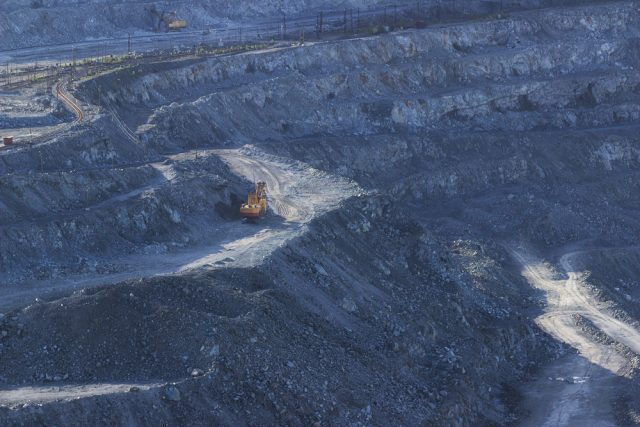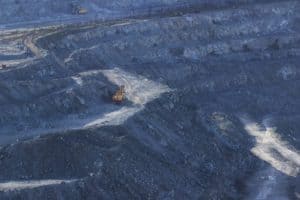In its economic diversification strategy, the Algerian government gives the industrial sector a very high priority, particularly with regard to the mining industry. According to the figures released by the National Agency of Investment Development (ANDI), the overall industrial domain benefited from 88.32 percent of the domestic and foreign investment received in this sector during the period from January to September 2017. According to Abdelkrim Mansouri, the director general of ANDI, mixed investments amounted to 262.83 billion dinars (more than $2 billion) in 2017, an increase of around 33 percent compared to the same period in 2016.
This North African nation has a rich natural potential and it is clear that it intends to exploit this wealth to revive its industrial production in the coming months. However, the latest challenge before Youcef Yousfi, Minister of Industry and Mines, is to make effective the exploitation and development of Algeria’s abundant mineral wealth.
Mining hurdles prevail
It should be noted that Algeria has mineral wealth, much of which is not yet exploited. Optimizing the exploitation of minerals is one of the opportunities for Algeria to further liberalize investments and increase the volume of domestic production and non-hydrocarbon exports. Iron, phosphate, lead, gold, zinc and fertilizers — raw materials needed for industrial activities and decoration — are now included in the various projects selected by the government to revitalize industrial activities.
According to studies conducted in recent years, Algeria’s mining potential is equivalent to that of the major mining countries such as Australia, South Africa, Russia, China or Brazil. From extraction to the manufacturing of finished products and equipment, the mining sector could make an effective contribution to the sustainable development of economic activities in the same way as hydrocarbons.
However, despite the huge potential of the country, the mining industries contribute no more than one percent of gross domestic product. Compared to its neighbors – Morocco and Mauritania — Algeria is lagging behind in the exploitation of its mineral wealth, notably iron, manganese and phosphate. This assessment is confirmed by Ali Kefaifi, a mining engineer and energy expert, who explains that, compared to Morocco for the exploitation of phosphate and manganese, and Mauritania for the iron ore, Algeria has not yet exploited the full wealth on its soil.
To this day, the country exports only one million tons of phosphate, whereas Morocco has attained 40 million tons of exports and boasts close to 20 factories of phosphoric acid and fertilizer derived from this — more than 20 years ago. Worse still, Algeria remains a major importer of mining products and annually spends $100 million in buying useful and ordinary mineral products, such as baryte — an essential ore for drilling oil wells — which is imported from neighboring countries, such as Tunisia and Morocco, for an amount of nearly $10 million.
Massive mining potential
“If we compare the Algerian mining potential to that of the major mining countries — Australia, South Africa, Russia, China, Brazil — then we could consider, as a reasonable hypothesis, that the mining value chain, from extraction till the manufacturing of finished products and equipment, will be able to contribute more significantly than oil to the growth of the national economy,” says Kefaifi, in the columns of a magazine specializing in energy, oil and gas.
However, Algeria still imports marble for nearly $10 million and other ordinary minerals (chalk, sand, kaolinite, granite, gravel, slaked lime and feldspars). To remedy this, the government has done mapping for areas with high potential for minerals and raw materials, and it has enabled the launch of partnership contracts in the exploration of ores.
Still, some questions remained unanswered in this industry that is hugely dominated by the public sector — for example, will the mining industry be open to the private sector, local and foreign? Will the public authorities provide facilitation to promote private investment, local or foreign, in these industrial sectors?
The contribution of private capital has boosted the mining industry in recent years with double-digit growth. To continue this dynamic growth, the government has indicated that various branches of this industrial sector will benefit from the investments and facilitations needed to increase the exploration and exploitation capacities in the coming months.
“The development process must be carried out inevitably and essentially through the private sector, because it alone ensures the conditions of efficiency, profitability, productivity, technological mastery and, ultimately, competitiveness,” emphasizes Ali Kefaifi.
Exploration and transformation
According to experts, the development of the mining industry necessarily requires knowledge of the production chain and mastery of techniques and advanced technology. Indeed, mineral exploitation requires several stages: exploration and mining research, mining — surface and subsoil — and, finally, the treatment of extracted resources taking into account the specificities of different ores.
As for the export of raw or processed mining products, it is carried out after the completion of several stages of the value chain: the extraction of ore (surface or underground), then its refining, then metallurgy (enhancement according to the needs of the market) and final consumption in terms of capital goods.
It must be noted that the mining industry is considered as an alternative to the hydrocarbon industry, whose exports could contribute to the development of the country’s economic activities. To achieve this, 38 sites are identified in 28 provinces and are proposed for exploration, among which 13 limestone sites are intended for the production of construction aggregates and crushed sands, ten sites for clay for red products, ten sites for production of sand for construction, three salt production sites for the food industry and a gypsum site for the production of plaster and tuff for public works activities.
The Tindouf region, in the south-west of the country, is rich in mining potential, particularly in terms of non-ferrous resources, such as salt, gypsum, clay and lime. According to the experts, the exploitation of the iron ore deposits of the important mining project Gara Djebilet will meet national needs. Built over more than 150km and at an altitude of 400 to 600 meters, the Gara Djebilet deposit is an open pit mine that contains mineral reserves of nearly three billion tons of ore.
“This is a strategic project because it will generate more than 5,000 jobs. In addition, other infrastructure related to the project will be created, such as the railway line linking the province of Tindouf to the rest of the nation, which will encourage the arrival of investors. Tindouf will eventually be a gateway to Africa,” says Moumen Mermouri, custodian of Tindouf. For his part, Ahmed Benabbas, the director general of the National Society of Iron and Steel (FERAAL) in charge of the study, exploitation, extraction, transport, processing and marketing of ores produced at industrial sites — indicated that, to ensure the rapid feasibility of this program, the company plans to install production units based on the availability of groundwater resources.
Messaoud Zoua, head of the mining office at the industry and mining department, said that the exploitation and feasibility studies were entrusted to foreign companies. Another feasibility study will also be launched to accurately determine the availability of energy materials needed for industrial production such as water, gas and electricity. Other production units are also being launched, including the production unit of bentonite at Maghnia, the production unit at Draissa for the baryte deposit and the construction of two new marble works in Skikda and Sig provinces in the east of the country.
Joint ventures
Three investment agreements, created in joint ventures, requiring an overall amount of $4.5 billion, will be charged with the exploitation of the new phosphate mine of Bled el-Hadba in Tébessa province, and the creation of a plant for the production of phosphoric acid and diammonium phosphate, via the transformation of phosphates and gas in the Souk Ahras province. A second plant will be responsible for transforming natural gas for the production of ammonia, technical ammonium nitrate, and ammonium and calcium nitrate in Skikda province.
When these units start producing, they will double the availability of minerals and reduce the cost of importing raw materials such as calcium carbonate, bentonite, baryte, marble and granite — materials needed for different industrial activities, including building and public sector works.
Construction aggregate requirements are estimated to increase to 300 million tons per year and sand requirements are estimated at 150 million tons per year. According to official figures, thanks to the implementation of these partnership agreements, the industrial platforms will create 16,000 jobs, of which 12,000 will be needed for the construction phase and 4,000 for the operation phase.
According to the government officials, the objective of these partnerships is to achieve a conversion volume of five million tons of commercial phosphate into phosphate fertilizers and the production of one million tons of ammonia — local production capacities that will also meet the needs of the agricultural fertilizer sector.
Huge production capacity
The upcoming industrial complex, with a completion rate of 70 percent and an investment of $2 billion, will have a production capacity of 800,000 tons of concrete rounds annually and will be able to meet local needs by the end of 2018. As for steel production, it will be two million tons per year and will reach four million tons in two years.
According to the National Agency for Mining Operations (ANAM), significant investments have been made in the province of Tamanrasset for the production of marble and granite, two products that Algeria has been importing for years. Granittam, a subsidiary of the Hasnaoui Group of Companies (GSH), created in 2016 and specializing in the stone industry (from extraction to processing and treatment), operates the quarries of good-quality marble and granite in different parts of Algeria. The aim of the company is to satisfy the national needs in this area.
“We are able to offer other stone products for various uses. It is therefore possible to manufacture granite squares for paving sidewalks, borders for sidewalks curbs, construction aggregates and even for the manufacture of concrete. In short, it is possible to fully exploit the blocks of stone and multitude of products on the market for the construction sector. While the challenge is great, there is also the will to succeed,” says Omar Hasnaoui, General Manager of GSH. The company aims to create a quality label: ‘Made in Algeria’. For this, GSH intends to call on the Portuguese, Italian and Chinese expertise to ensure the transfer of technical know-how.
The Minister of Industry and Mines, Youcef Yousfi, says: “Algeria will also revive the exploitation of its gold reserves.” During a hearing before the Finance and Budget Committee at the National People’s Congress (NPC) about the review of the 2018 Finance Bill, the Minister revealed that the South Gold Mine Project is currently in negotiations with renowned companies.
According to confirmed sources, the country has a large gold reserve, estimated at 121 million tons — a potential confirmed in the report of the World Gold Council, published in 2016, which places Algeria at the forefront in Africa. At this growth rate, will Algeria be able to elbow its way to quickly position itself on the world market for mining products? It’s a situation worth waiting and watching for indeed.









